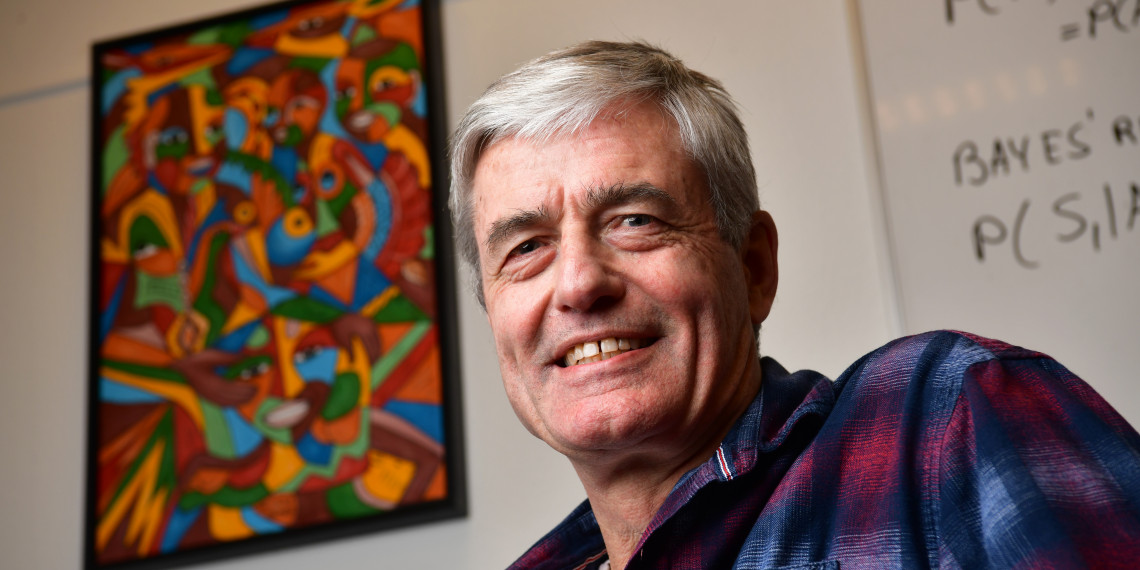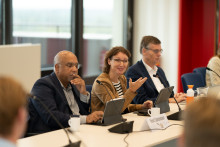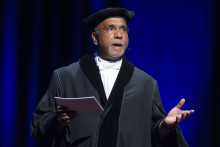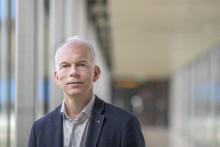‘Yes, I regularly clashed with board members’, Meijer concludes. Now that his retirement is approaching, he looks back on a long career as a mathematics lecturer and member of the University Council. Over the past decades as a representative of the campus community, he has never been afraid to speak his mind. ‘And when I speak out, it feels like a burden is lifted from me. Sometimes board members would make things very personal, but that didn’t bother me much. I have a thick skin.’
A University Council without Dick Meijer: it takes some getting used to. No critical pleas and clashes with board members. At the end of this year, the whetstone and thorn in the side of the Executive Board will retire. Last summer was the first time that his name was missing from the list of candidates for the University Council. Will he miss it? It would seem the departing mathematics lecturer is not one for such melancholic thoughts. ‘I’m closing the door behind me and moving on to other things: travel, sports and odd jobs around the house. But if they need advice, they’re always welcome to call me.’
Football and maths
So there will be no long, emotional farewell speech at his reception; despite the fact that there is plenty to say about his time at UT. His campus career started at Technische Hogeschool Twente (Twente Technical University, THT). In 1974, Meijer came from Nijmegen to Enschede with a ‘half-soft g’. ‘I liked it better in Twente. Student life was centred in sports and cultural associations instead of preppy student clubs like in other cities. I really disliked that. I’m very much against elitism. That’s not something that was instilled in me growing up, but rather something that stems from myself.’
‘I was more concerned with football than with THT’s policies during my student years’
The algemene propedeuse (general foundation year) also played an important role in Meijer’s decision to come to Twente. Under this form of education, which was unique in the Netherlands, students were allowed to pursue multiple fields of study in their first year before having to choose one. ‘I hesitated between physics, maths and chemistry. But when I arrived on campus in August, it turned out that the general foundation year had been abolished.’ A booming laugh. ‘Ultimately, I decided to stick with maths.’
Apart from studying, which came easily to him, many of his student days were spent on the football field or in the boardroom of football club Drienerlo. And his campus flat, Café 56B, served as a home base for him too. During those years, Meijer had little or no interest in the university’s administration and policies. ‘I’ve always been a critical person, but during my student days, there was little reason to get involved in the administration. Things were well organised on campus. Education was top-notch and the facilities were up to scratch too. The 1970s saw the democratisation of the university. There was an elective campus board, for instance, much better than today’s Student Union management. I was more concerned with football than with THT’s policies during those years.’
Engineer’s approach
After graduating, Meijer went on to work as a maths teacher in several Twente towns. However, the 1980s were not an easy time for young jobseekers. The young teacher regularly found himself having to combine several jobs. ‘I was always on the verge of losing my job until I was offered a position at UT. The university had grown rapidly and was in need of maths teachers. In the late 1980s, the first educational staff were appointed, and I was one of them.’ What followed was a long career as a mathematics teacher. Meijer taught statistics and probability. ‘For every piece of theory, there are countless practical examples to give; that’s the beauty of these two subjects. Engineers are interested in applications. The essentials are always the same: analyse a problem, model it, do the calculations and interpret the results. Nothing has changed about this engineer’s approach in all these years. However, I’ve noticed that students’ basic skills have declined. Nowadays, we have to brush them up on their knowledge.’
‘I enjoy representing people, standing up for colleagues who are in a fix or need advice’
Criticaster
It was not long before Meijer started attending various participation councils. ‘I wanted to know how things worked, how decisions were made, because I didn’t always agree with them.’ The maths lecturer increasingly found himself acting as a confidential adviser for UT employees. ‘When someone knocks on my door, I always make time for them. I have often accompanied people to meetings with their superiors. And if I detect a pattern, I try to raise it at the University Council. I enjoy representing people, standing up for colleagues who are in a fix or need advice. That’s always been my main drive.’
Within that same council, Meijer proves himself a criticaster of the Executive Board. Social policy, workload, unbridled growth, online education, the English language and the Twente Educational Model (TOM) are key issues the lecturer is committed to, or campaigns against. He regularly clashes with board members. ‘I was accused of having a conservative worldview, of clinging to outdated ideas. But I’m a social democrat, with the emphasis on democrat. We can only properly organise things through consensus, and in order to achieve that, we have to engage in discussions. Board members prefer deeds over words, but in my opinion, we shouldn’t always blindly go along with things. After all, it’s extremely difficult to reverse policies once they’ve been implemented.’
Frustrations
For example, there has been far too little discussion on the decision to use English as the language of instruction, according to Meijer. ‘It was pushed through. As a result, the accessibility and quality of the education have been compromised. I’m in favour of a bilingual university that offers at least its bachelor’s study programmes in both Dutch and English. Our societal duty is to train engineers for the region and the Dutch knowledge economy, and we’re currently neglecting this duty.’
The introduction of TOM is also an ongoing source of irritation for the maths lecturer. ‘It was a gigantic undertaking for my colleagues, who had to rearrange entire course programmes. The introduction didn’t go smoothly. It took six, seven years before we were able to remedy some of the negative effects of TOM. And the way I see it, it’s more like occupational therapy for students than actual academic education. All lecturers in the University Council were opposed to the TOM proposal. But thanks to students and support staff voting in favour, it was ultimately pushed through.’
‘These days, there is hardly any room for open discussion of policies at UT’
Out of frustration with the introduction of TOM, Meijer actually went on leave for a while in 2013. He left for Gambia for several months. He and his family visit there regularly. For years, his wife Marianne has run a shop in Beuningen where she sells Gambian products. Meijer himself teaches mathematics at a Gambian university. ‘That happened organically. During our first holiday in Gambia, we played football with some kids. We learned that they couldn’t afford their school fees – less than a hundred euros a year. From that moment on, we started supporting children in Gambia.’
Voice of criticism
With his farewell drawing closer, the next trip to Africa is already on the agenda. Meijer’s departure leaves UT without a headstrong representative of ‘the shop floor’. Is there anyone who can fill his shoes? ‘I’m a little worried about that. I’ve never thought highly of this university’s critical capacity, so I tried to be that voice of criticism myself, as it was very much present on the shop floor. But these days, there is hardly any room for open discussion of policies. Perhaps it has to do with the current day and age. It’s also an intrinsic characteristic of technical universities: people are driven and occupied with their own work, so they just let things slide.’
But these drastic changes have transformed UT into a different university in recent years, according to Meijer. ‘At its core, UT is still a great university to work and study at. However, I’ve missed that sense of home these past few years.’ The retiring mathematics lecturer is doubtful whether the current Executive Board will be able to turn the tide. ‘The tone is nice, but there is no progress. Take the workload, for example. Much of the workload has been created by UT itself, for example through the implementation of TOM. We have to be willing to take a critical look at the current policy.’
And that is exactly what Meijer has been doing all these years. He proudly reflects on the times when the University Council was able to bring the Board back into line. One example was during a major reorganisation: ‘People were in danger of being crushed by the machinery of a poorly thought-out reorganisation. We, as the University Council, told the Board to go back to the drawing board, which allowed us to prevent 25 redundancies. As a result, no one was forced to go. That’s what the participation body can achieve and it’s what I’ve always fought for.’








